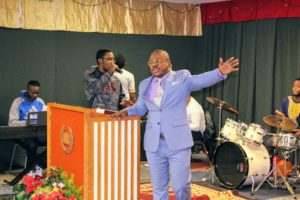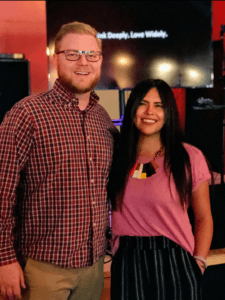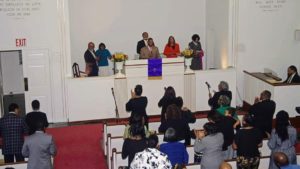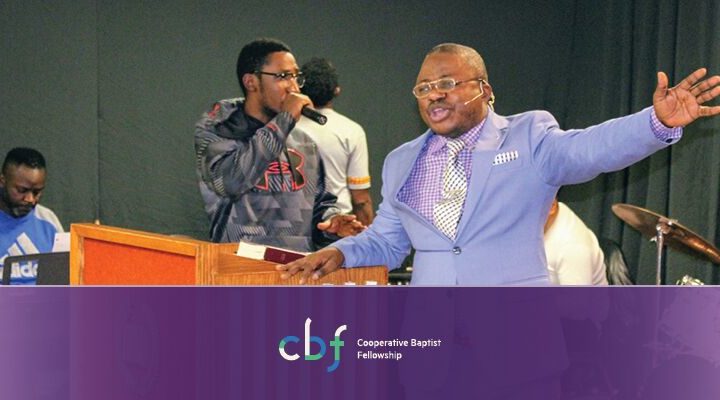By Blake Tommey
“I’m so excited about the diversity of church starts that we have in Cooperative Baptist Fellowship life,” Kyle Tubbs, CBF’s New Church Starts Manager, says. “We have churches led by both women and men, black, Latino and white leaders, older and younger, immigrants and native-born Americans, pastors who are beginning their second career and pastors who are fresh out of seminary. Our church starts really embody the future that we desire for the Cooperative Baptist Fellowship.”

Church Starter and Congolese refugee Felix Iyoko preaches to his congregation, Shiloh Restoration Church in Raleigh, N.C.
Tubbs, who joined the CBF staff in May 2018, began his own ministry as a church starter in Round Rock, Texas, and says one of the many gifts of new churches is their ability to reflect and respond to a distinct community and its needs. “Demographics in the United States are rapidly shifting, and our new church starters are reflecting those changing demographics by contextualizing ministry in their local communities,” he explains. That means no two church starts look or act the same, which is great news for CBF.
Peace of Christ Church, just north of Austin, Texas, which Tubbs helped launch in 2012, remains a close partner in CBF’s church starting initiative. When Tubbs departed his role as lead pastor last year, the congregation gave unanimous support to then-pastor of spiritual formation, Aurelia Davila Pratt, as his successor, a hurdle which many new church starts don’t survive. With Pratt’s fresh leadership, Tubbs says, Peace of Christ Church has navigated the delicate work of adjusting their vision and mission to better reflect Round Rock’s growing and diverse community. Those adjustments include altering their worship style and even participating in inter-religious dialogue with local faith groups.
In Raleigh, North Carolina, Shiloh Restoration Church, another church start partnering with CBF, is engaging Swahili-speaking refugees and immigrants, many of whom arrived in the United States fleeing political violence in the Democratic Republic of Congo. Their pastors, Felix and Nicole Iyoko, began pastoring in their home country of Nigeria, but discerned a call to North Carolina’s Research Triangle, where an increasing number of migrants are rebuilding their lives in the U.S. Despite a fresh start, Felix says, many families face overwhelming challenges adapting to life in a new country.

Kyle Tubbs and Aurelia Davila Pratt at Peace of Christ Church in Round Rock, Texas, where Tubbs served as lead pastor and CBF church starter from 2012-2018. Pratt is now lead pastor of the congregation.
“When resettled in the United States, families often find themselves unable to worship God or attend any church because of language barriers,” Felix says. “So the primary objective of our church is to improve the standard of spiritual living of Swahili-speaking families by providing hope to refugees who are dealing with challenges and despair in their lives.”
Wayne Weathers, who became CBF’s first commissioned African-American church starter in 2016, is also continuing to grow his congregation, Vision of Hope Baptist Church, Tubbs says. Previously sharing worship and office space in Philadelphia’s Strawberry Mansion neighborhood, Vision of Hope acquired their first property and church building in 2018, 10 miles north in Jenkintown, Pennsylvania. As Vision of Hope took shape in 2014, the congregation learned to reflect one of Philadelphia’s most disempowered neighborhoods and embody God’s hope amid drugs, violence and economic disparity. They’re now meeting a fresh challenge, Tubbs says, as they get to know their neighbors in Jenkintown and reach across cultures to an entirely new context.
“New church starts keep us fresh, forward-thinking and creative,” Tubbs says. “Cooperative Baptist Fellowship is a movement, and church starts keep that movement going. They keep us thinking about growing and expanding. They’re a large part of our future. In no way does that put down established churches, though. On the contrary, church starts need established churches and the two must work in tandem. But, church starts have a unique opportunity to quickly adapt to challenges, cultures and needs, and to teach us how to form around those.”

Rev. Dr. Wayne Weathers speaks to his church during worship at Vision of Hope Baptist Church in Jenkintown, Pa.
In June, CBF will commission 8 new church starters at the General Assembly in Birmingham, Alabama, and begin a long-term relationship with each, Tubbs says. Once a church starter has successfully completed an eight-week online discernment cohort and exploratory conference in Decatur, that church and CBF enter into a three-year partnership, which entails continued coaching and monthly financial support. This summer, CBF’s church starting partnerships will reflect CBF’s growing diversity, including more women pastors and Latino congregations, including a church start on the southwest border, all of which teach us more about the creative spirit of God, Tubbs says.
“The diversity and vision of these churches reflect the character of God, who is limitless and constantly creating,” he says. “These churches teach me about God, and I’m able to experience a broader understanding of God’s goodness in the world because of them.”
For more information about CBF’s New Church Starts Initiative, visit www.cbf.net/churchstarts.
The Cooperative Baptist Fellowship is a Christian Network that helps people put their faith to practice through ministry efforts, global missions and a broad community of support. The Fellowship’s mission is to serve Christians and churches as they discover and fulfill their God-given mission. Learn more at www.cbf.net.


